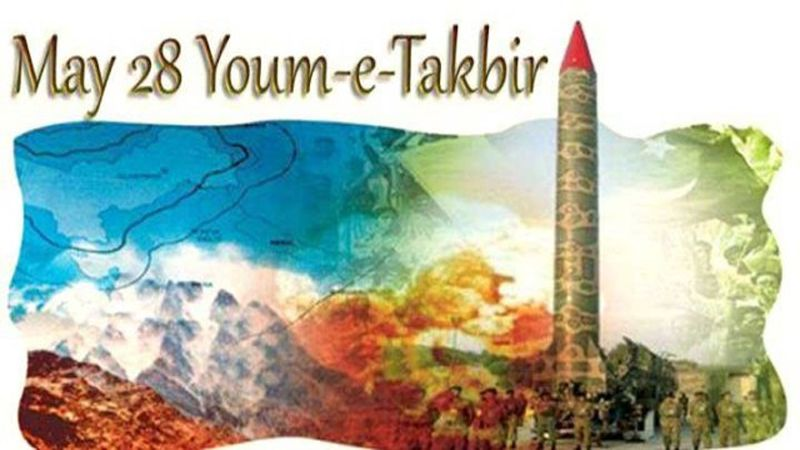by Muhammad Mohsin Iqbal
The 28th of May 1998 stands as a solemn yet proud landmark in the annals of Pakistan’s history—a day when the nation, in response to regional provocations and the overt display of aggression by its eastern neighbour, chose to proclaim its sovereign right to self-defence through the demonstration of nuclear capability. Chagai’s hills echoed not merely with the thunder of nuclear tests but with the resolve of a people determined never to be subdued. It was a declaration that Pakistan would maintain strategic balance in South Asia, uphold its territorial integrity, and pursue peace from a position of strength. The world beheld a nation that had been tested time and again, now entering the nuclear club with dignity, under the firm leadership of Prime Minister Nawaz Sharif, and with the undying spirit of Dr. Abdul Qadeer Khan and countless anonymous contributors to its nuclear programme.
India’s five nuclear tests on May 11 and 13, 1998 at Pokhran, in blatant defiance of international expectations, were not only a challenge to regional stability but a direct threat to Pakistan’s existence. This was not an ordinary adversary flexing its might. It was a historical rival that had already waged wars in 1947, 1965, and 1971, and maintained an enduring animosity since Partition. Pakistan, faced with a decision of existential proportions, could either capitulate to global pressure or assert its sovereign right to self-defense. History bears witness that it chose the latter — wisely, bravely, and resolutely.

The Holy Qur’an guides us: “And prepare against them whatever you are able of power and of steeds of war by which you may terrify the enemy of Allah and your enemy…” (Surah Al-Anfal, 8:60). This Divine injunction places upon every Muslim state a sacred duty to maintain deterrence against hostile forces. The leadership of Pakistan fulfilled this responsibility in letter and spirit, acting with wisdom and patience in the face of enormous international pressure.
The road to nuclear capability was not paved overnight. It began decades earlier, most crucially after the 1974 Indian nuclear explosion euphemistically termed a “peaceful nuclear test.” Prime Minister Zulfikar Ali Bhutto’s call to action, famously stating, “We will eat grass, even go hungry, but we will get one of our own,” set the course. Under the guidance of patriotic scientists like Dr. Abdul Qadeer Khan and institutions like the Pakistan Atomic Energy Commission (PAEC), relentless efforts ensued, despite international sanctions and espionage threats.
By 1998, Pakistan had achieved the technological capability to deter any nuclear adventurism. When India dared to test, Pakistan responded with Chagai-I and Chagai-II on May 28 and May 30, respectively. The tests were not acts of aggression, but rather of restraint and responsibility, aimed at restoring strategic balance in South Asia.
Nearly three decades later, on 7 May 2025, Pakistan was once again thrust into a moment of existential assertion. In what has come to be described as a manufactured yet perilous one-day war, the people and the armed forces of Pakistan responded with unity, valour, and an unyielding sense of purpose. Just as the nuclear tests of 1998 had secured Pakistan’s external deterrence, the events of 2025 reaffirmed the nation’s internal cohesion and operational readiness. Though provoked under the shadows of global intrigue, Pakistan emerged with honour, bearing its wounds with pride and saluting its martyrs with reverence. The spirit of Chagai lived on—not in uranium and plutonium alone—but in the hearts of those who defended the motherland with blood and resolve. Thus, the linkage between these two dates is etched in Pakistan’s collective memory as chapters of defiance, sacrifice, and unwavering national dignity.
The importance of strong defense is also emphasized in the sayings of the Holy Prophet (peace be upon him). He said, “Tie your camel and trust in Allah” (Tirmidhi). This Hadith beautifully encapsulates the philosophy that while ultimate trust is placed in Allah, it is also imperative to adopt worldly means for security and survival. Pakistan did precisely that by fortifying its defenses through nuclear deterrence.
Pakistan must also guard against the illusion that nuclear arms are a panacea for all threats. Hybrid warfare, cyber-attacks, economic subversion, and internal discord are new battlefields. As the Holy Qur’an reminds us, “Indeed, Allah will not change the condition of a people until they change what is in themselves.” (Surah Ar-Ra’d, 13:11). A strong missile or a mighty bomb cannot compensate for a divided society or a failing economy.
On the 28th of May each year, we salute our scientists, soldiers, statesmen, and all those silent hands who toiled in secrecy and sacrificed for the motherland. Let this day not just be a celebration of explosions, but of resolve — a reminder that Pakistan, when united and determined, can stand its ground against any global tide.
May Allah protect Pakistan and guide its leaders to act always with justice, wisdom, and fear of Him. “O you who believe, be persistently standing firm in justice, witnesses for Allah…” (Surah An-Nisa, 4:135). Let this resolve shape our future, just as it shaped our past.

















